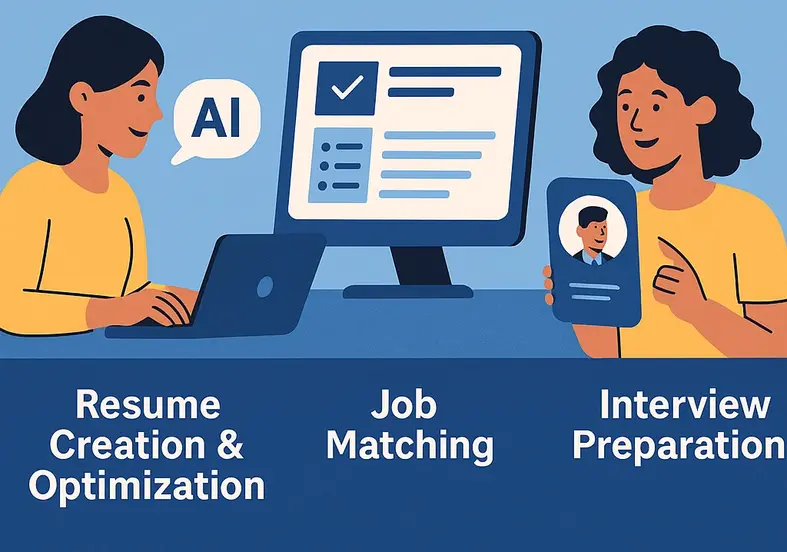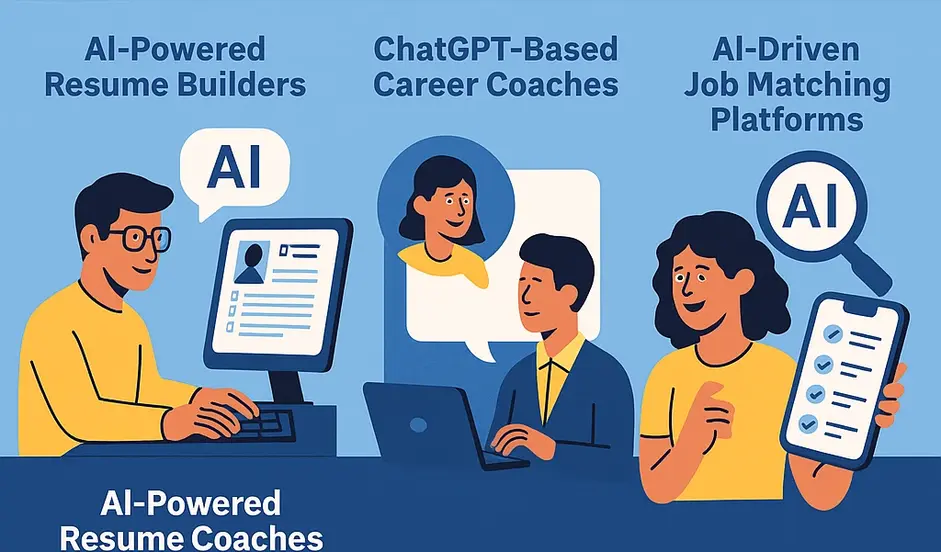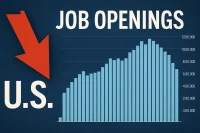AI tools changing the job search are revolutionizing how hiring works in 2025. From smart résumé screening to AI-driven job matching and virtual interview coaching, artificial intelligence is reshaping how candidates apply and how employers hire across the U.S. The result: faster, more accurate, and highly personalized job-hunting experiences.
With competition at an all-time high, candidates who embrace AI tools are gaining a powerful advantage in a tech-driven job market. Here’s how AI is revolutionizing the job search—and what you need to know to stay ahead.
Table of Contents
Smart Tools Reshaping the Job Search Experience
1. AI-Powered Resume Builders
Intelligent résumé generators like Rezi, Zety, and Kickresume now offer real-time keyword analysis and formatting tools to tailor documents to specific job descriptions. These tools use natural language processing to improve readability and ensure applicants pass automated screening systems (ATS).
“Our AI scans over 100,000 job descriptions weekly to optimize résumé content for relevance and impact,” says Jane Liu, Product Director at Rezi.
2. ChatGPT-Based Career Coaches
AI career assistants like the WhatJobs GPT Career Assistant and LinkedIn’s AI-powered job prep feature provide tailored job search advice, interview simulations, and goal-setting support. These tools offer on-demand guidance for everything from negotiating offers to changing industries.
3. AI-Driven Job Matching Platforms
Leading job boards such as WhatJobs, ZipRecruiter, and Indeed now rely on machine learning to analyze user behavior, skill sets, and career goals. As a result, job seekers receive highly personalized alerts with fewer irrelevant listings and higher success rates.
How Employers and Recruiters Use AI Tools Changing the Job Search Landscape
Automated Candidate Screening
HR tools like HireVue and Pymetrics use behavioral data and cognitive science to evaluate soft skills, problem-solving, and team fit. These tools help reduce time-to-hire and eliminate repetitive screening tasks.
Interview Intelligence
Employers increasingly use AI to evaluate interview performance by assessing tone, pacing, and clarity. AI-generated reports help recruiters make informed decisions while aiming to reduce unconscious bias.
“AI supports our hiring process by offering consistent data-driven insights. It doesn’t replace humans—it enhances how we understand talent,” says Mark Hill, VP of Talent Strategy at a Fortune 500 firm.

The Rise of Personalized Job Assistants
AI tools are consolidating job search functions into unified platforms. Notable examples include:
- WhatJobs AI Assistant – combines job matching, application tracking, and smart search filters.
- LoopCV – automatically applies to jobs based on user-set preferences.
- Jobscan – offers instant résumé scoring against job descriptions and ATS compatibility ratings.
These tools save hours of manual work, helping candidates focus more on prep and networking.
The Pros and Cons of AI in Job Hunting
Benefits
- Time Efficiency: AI speeds up job search tasks, from résumé creation to application submission.
- Precision: Tools adapt based on job seeker preferences, improving match quality.
- Accessibility: Most AI platforms are cloud-based and mobile-ready, allowing 24/7 access.
Concerns
- Bias in Algorithms: Tools trained on incomplete data may unintentionally exclude diverse candidates.
- Skill Degradation: Over-reliance on AI may reduce development of soft skills or interview readiness.
- Data Privacy: Platforms collecting user behavior may raise concerns about transparency and consent.
Reference: FTC Guidance on AI in Employment
Emerging Trends to Watch in 2025
Mobile-First AI Job Tools
With 72% of users job-hunting via mobile devices, platforms like WhatJobs and LinkedIn’s mobile app now offer mobile-optimized AI support, job alerts, and résumé tweaks on the go.
Skills-Based Hiring
Employers are increasingly evaluating candidates based on demonstrable skills rather than degrees. Platforms like Coursera, Skillsoft, and Udemy are integrating with job boards to suggest micro-certifications aligned with job listings.
AI for Salary Insights
Job seekers are turning to tools like Levels.fyi and Paysa for real-time salary benchmarking, helping them negotiate more confidently based on verified compensation data.
The Future of AI in Job Search
The job market in 2025 is driven by one clear truth: those who embrace AI tools gain a measurable advantage. With the right combination of technology, strategy, and authenticity, candidates can streamline their search, stand out from the crowd, and land roles that align with their goals and values.
As AI evolves, it will increasingly personalize the job hunt—delivering actionable insights, real-time coaching, and better job-candidate matching. Human decision-making remains key, but with AI at their side, job seekers are empowered like never before.
For the latest updates on job trends, AI hiring tools, and smart job seeker tips, visit WhatJobs News
Frequently Asked Questions
Q: Are AI job tools replacing recruiters?
A: No, but they are enhancing the recruitment process by automating low-value tasks, making recruiters more strategic in their hiring decisions.
Q: Do I need technical skills to use these AI tools?
A: Not necessarily. Most tools are designed for non-technical users and offer step-by-step support or user-friendly interfaces.
Q: Are these tools free?
A: Many platforms offer free tiers with limited access. Premium features—such as live coaching, unlimited applications, or real-time scoring—are typically part of paid subscriptions.
Q: Which sectors benefit most from AI-driven job tools?
A: Tech, digital marketing, healthcare administration, education, and remote customer support are seeing the most AI-driven hiring activity today.




